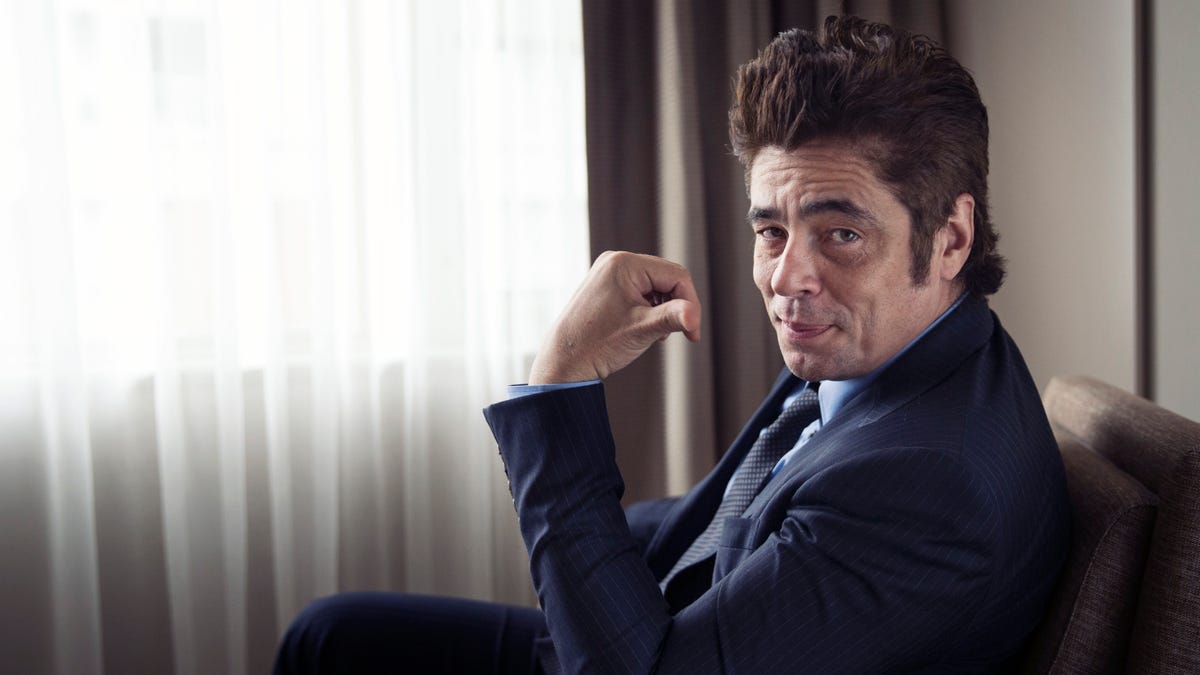
Benicio Del Toro poses for a portrait in promotion of his upcoming role in "Sicario" at the 2015 Toronto International Film Festival on Friday, Sept. 11, 2015 in Toronto. (Photo by Victoria Will/Invision/AP)
TORONTO (AP) – No other actor has covered all angles of the war on drugs — its tragedies, its violence, its farces — more than Benicio del Toro.
It's a story that has followed the Puerto Rico-born actor from the start: One of his first credits was the 1990 NBC miniseries "Drug Wars: The Camarena Story."
He's played a recovering drug addict ("21 Grams") and one not so recovering at all ("Fear and Loathing in Las Vegas"). He starred as Pablo Escobar in last year's "Escobar: Paradise Lost." And the critical pinnacle of his career came in his Oscar-winning performance as an honest Mexico police officer in Steven Soderbergh's "Traffic."
In Denis Villeneuve's muscular, grim thriller "Sicario" (which opens Friday and expands nationwide Oct. 2), del Toro finds himself back on the other side of the border, playing a mysterious mercenary joined with a CIA task force covertly pursing a Mexican drug lord.
"I don't know how it comes about, but all I can say is I'm an actor in this time," says del Toro. "Movies borrow from their times. These stories are out there in the newspapers."
"Sicario," which debuted at the Cannes Film Festival in May and had its North American premiere at the Toronto Film Festival, has already drawn raves for del Toro's terse gravitas as a shadowy man known only as Alejandro. He says little but has a weighty presence. "Nothing will make sense to your American ears, and you will doubt everything we do," he warns Emily Blunt's less-experienced FBI agent.
"I've been in movies where I think it's going to work, and it doesn't. I've been in movies where I thought it wasn't going to work and it did," del Toro said in a recent interview. "And I tell you this one was one of those that I didn't know."
Villeneuve, the Quebecois director of "Prisoners," was more confident.
"He knows a lot about that world being involved in movies and coming back with people who were involved in drug wars," says Villeneuve. "For me, he was a source of information."
Cinematographer Roger Deakins likens the weary-eyed del Toro to Robert Mitchum. Villeneuve would often cut del Toro's dialogue, stripping the part down as he realized the actor did more with less.
"It was very simple. I just cut 90-95 percent of his dialogue. Most of the time it was: 'Say nothing. Action!'" says Villeneuve, chuckling. "He's someone who's very radical about authenticity. When he doesn't feel something, he cannot act. It has to come from a deep emotional understanding."
That del Toro, whose family moved to Pennsylvania when he was 12 years old, has frequently found — or been found by — drug-war tales is somewhat surprising to him. But it's an issue he says he feels passionately about.
"I've done my best not to repeat myself," he says. "I've done many characters that live in that world, the drug wars and the drug world, but this one had a different angle."
This string of films, from "Traffic" to "Sicario," only make up a small part of del Toro's varied credits. He has played Che Guevara ("Che"), been a regular in the Marvel universe as The Collector and will always be beloved for his mumbling Fred Fenster in "The Usual Suspects." He was also recently cast to play the villain in Colin Trevorrow's "Star Wars: Episode VIII."
"It's a cool part. It's a cool director that I'm really excited to work with," says del Toro. "You've got to build it up from zero, the character. But it's going to be exciting. Hopefully it will work."
It's not lost on the 48-year-old del Toro, though, that the strife and pain caused by the war on drugs has now spanned his entire career. He believes the legalization of drugs deserves consideration.
"It's time to evaluate the tactics," he says, noting that Colombia is now much safer. "It's real scary what's happening in Mexico."






